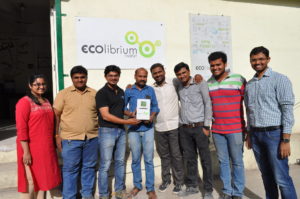
“Having the whole of society focus on one ambition is what we need now.”
How can a prize make a difference to an abiding problem like climate change? Harriet Lamb, CEO of Ashden Sustainable Solutions, Sustainable Lives explains to Andrew Milner how the Ashden Awards are not all about the winners – or the money – but how the whole process uncovers and highlights the many organisations doing important work to combat climate change and helps them to obtain the support they need. She also explains how that process underlines Ashden’s whole philosophy, that there are solutions to the climate crisis already at work, which can be more widely adopted.
First of all, could you clarify the relationship between Ashden and Ashden Trust?
Ashden Trust gives money to support work on climate change, but also other issues. Ashden, which receives, rather than gives money, is focussed on innovative solutions to climate change. We give awards and do programmes on the back of that to help promote the solutions that we believe are out there already. What connects the two is that Sarah Butler-Sloss, who is a member of the Sainsbury family, founded both organisations. The Trust does give support to Ashden but they are and always have been separate organisations.
How significant is that support?
It’s really important because it supports our core work and as you know, that is often the most difficult piece for charities. Everyone wants to focus on the frontline, but to do really great delivery, you also have to have a really great core and that’s where the Ashden Trust, together with other Sainsbury family charities are absolutely critical. Also we’ve recently received USD1 million over 18 months from K-CEP, the Kigali Cooling Efficiency Programme, to support innovations tackling dangerous levels of heat in our cities and elsewhere. So this year, it’s the Ashden Trust and the other Sainsbury family trusts, plus K-CEP who are our biggest donors.
We have this great network of inspiring people who have created alternative solutions which often include technology, but critically, include a workable business model.
We also fundraise. Each of the awards, which are our crown jewels, is sponsored by organisations from across the sectors. For example, BEIS, the UK government department that focusses on energy, sponsor an award, so does Citi and Waterloo Foundation is another very loyal award sponsor. Then we look separately for grant funding so we can help our network of over 230 alumni, pioneers throughout the world doing amazing work, scale up their solutions.
You’ve been in post around six months now. Sarah Butler-Sloss was running Ashden before. Does your appointment mean a change of focus or direction or is it simply a case of fresh legs, so to speak?
I think it’s a perfect combination because we have continuity with Sarah in the role of chair. She has great connections and is well respected throughout the energy access world and that’s combined with, as you say, a fresh pair of legs. Sarah has built a small team who are incredibly knowledgeable on climate change issues and the awards are now very respected within the energy access world. Ashden has an existing strategy and my role is to look at that and say what’s working really well and, above all, how do we rethink the ambition of the strategy in the light of the climate crisis. The warnings from science are getting worse and worse and the biggest thing I’ve been doing is to take the strategy, the heritage and see how we can scale that up.
Does that mean more emphasis on policy advocacy?
I think that the political landscape has been transformed in the last couple of years by a combination of the almost daily warnings from the scientists and things like the David Attenborough[1] films and the work of committed activists, like the school strikers and Extinction Rebellion which have undoubtedly helped shift public awareness of the problem and pushed the issue up the political agenda. That creates opportunities for us to push solutions we know can work but which until now have been overlooked because the political will wasn’t there. To give you an example, for about six years now, Ashden has worked in schools. At first, we did awards that were about reducing carbon, but then we realised that what people wanted was help in reducing their carbon footprint, so we set up peer group learning clusters where 10 schools in an area share experiences about what they are doing to reduce their carbon footprint. Those involved save on average 14 per cent on their energy bills and 12 per cent on their carbon footprint.
That would be the Less CO2 scheme?
Exactly. We’ve worked with 450 schools, all told but there are 28,000 schools in the UK and we just weren’t moving fast enough, so we’ve decided not only to continue the scheme, but to form a coalition with others and call on the government to develop a plan of how all schools are going to be carbon-zero ideally by 2030. What we want to do is to work with, say, five schools to get to carbon-zero, so we can show that it is possible and what it cost and to call on the government to put in place legislation for all schools across the country to do it. So that’s an example of taking something we’re doing already and trying to push it forward to scale. That’s what Ashden does. The climate crisis seems overwhelming and frightening and it’s not immediately obvious what we can do about it and I feel Ashden’s role is to be saying ‘the solutions are there, we don’t have to wait for some incredible machine that’s going to refreeze the Arctic, we can actually do things in our primary school down the road.’ That’s why, in July we’re hoping to host a solutions hub in London. It’s London Climate Action Week and we’d like to bring all the amazing innovations we know are there together. People could come and see them and be inspired.
Another example to your point about working with government. Over half the local authorities in the UK have now declared a climate emergency, but have realised that they now need an action plan. We found that the local authority sustainability officers charged with coming up with a plan didn’t have a chance to share ideas, so we set up a network and from that network, we put together our local authority toolkit so they could see what others were doing and it’s been an absolutely hit success. We’ve simply taken all the solutions that we know about through our awards process and the networks on, say, lift-sharing or retrofitting houses and so on, which they can use and adapt.
To come on to the awards, which are the core of Ashden’s work. How many categories are there?
It really depends what we’re focusing on in any particular year, but there’s normally about a dozen. We’ve got some new ones this year. In particular, there is what we’re calling the humanitarian award. There are now something like 70 million refugees and, with climate change, it will get worse, so we wanted to look at those people who often don’t have access to energy in camps or temporary shelters and see if there were new and exciting business models perhaps owned by refugees themselves that would show ways to bring power to them. We’ve had so many applicants that we’re going to have a wonderful shortlist. Another new one is about nature-based solutions. Then there are our more long-standing ones like innovation in the UK and cooling which we did last year for the first time.
We need to acknowledge that these are real pioneers doing really difficult work, so you absolutely need grant-funding or new financial models for it to work commercially and sustainably in the end.

Electric rickshaw by SMVNP Green. Photo: Ashden
How many winners are there per year or does it depend on the quality of applicants?
We’ve always found a winner in every category we run. But it’s not all about the winners, it’s about the whole discovery process and we always look at ways in which those organisations that come second or third can also be part of the follow-on activities, like connections with investors or other organisations that can help them go to scale. We have this great network of inspiring people who have created alternative solutions which often include technology, but critically, include a workable business model. One of our winners last year was SMVNP Green in India who produce electric rickshaws. Their breakthrough was that they realised that, because rickshaws don’t go very far, you don’t need to stop and recharge the battery, you can have a relay system where you stop at a designated station, drop off your battery, pick up a fully charged one and off you go again. The company was absolutely committed to helping the rickshaw drivers become owners of the rickshaws, so they set up a model where they made loans which the drivers paid off over time. Then they realised that they only came across men and they wanted to encourage female drivers, so they launched a scheme so that women were also coming forward as rickshaw drivers, earning an income and able to own their own rickshaw. For us, that’s a classic case, of a technological innovation, combined with a social and economic outcome.
And how big are the prizes?
It varies between about £10,000 and £20,000. The money’s not usually significant for most organisations – though it can be very significant for smaller organisations – but it’s only one part of what Ashden offers. For example, our cooling work with K-CEP goes way beyond the award. We will be distributing over £600,000 in grant capital from K-CEP to up to seven organisations from all over the world that are able to raise the profile of climate-friendly cooling solutions through creative projects and campaigns that will directly affect the lives of people at risk from heat stress. So the intelligence we gather from the award process will really help drive powerful investment in this sector.

Ecolibrium Energy. Photo: Ashden
Ashden can connect people to investors interested in climate solutions and that’s the bigger gain along with the profile and the reputational brand they get from being involved in an international award. For example, we helped 2017 Award winner Ecolibrium Energy raise a large portion of it’s $10million equity funding round, by connecting the organisation’s staff to the funders in our network.
So there’s a whole raft of support that goes with it.
Exactly. There’s a package of business support as well, which again really varies. Some organisations are amazing at communication, some are very good at fundraising, others really benefit from coming on our fundraising or communications masterclasses. So it depends where the organisation comes from and what stage of development they are at. Also, they are part of that network of Ashden alumni. We’ve taken our climate action toolkit round the UK organising events for local authorities and there’ll always be one or two of our winners on the panel, so they’re getting the opportunity to talk about their work in front of an informed audience, hungry for solutions.
Having the whole of society focus on one ambition is what we need now, starting with the way we teach climate change and sustainability in schools
Do you have a good example of the trajectory of one of your successful prize-winners?
In the commercial world, something like nine of out 10 products fail, so even among the winners, there are some that stumble because this is a really new and difficult field. Where it’s been most testing is in access to energy for some of the world’s poorest people. It doesn’t matter how brilliant your organisation or your idea is, if there’s a drought two years running, poor people are not going to be able to repay you for the home solar panel system you sold them on a credit basis. So you have young companies taking huge risks in a difficult market and that’s where we absolutely need the angel investors, the true philanthropists who are ready to say to people like that, ‘we’ll back you for another year until things look up again.’
On the other side, there are people who zoom ahead. For example, Chargemaster, someone we awarded for developing charging points for electric vehicles, got taken over by BP.

Highview Power. Photo: Ashden
Just to be clear, some of these will be NPOs, rather than enterprises which work according to a standard business model?
Absolutely. We have a mixture. For example, we have community interest companies or community enterprises, like Repowering, who are the first community-owned company to put solar panels on social housing in Lambeth and Hackney [London boroughs]. The energy generated goes into the social housing, the excess is sold to the grid and with the money they make from that, they are able to train marginalised people in solar energy. On the other side, is Highview Power, a mainstream, for-profit company who have developed technology to store renewable energy. And there are local authorities, too, like Medellin in Colombia, to whom we gave a cooling award. They’ve trained marginalised young people in horticulture and transformed rubbish dumps into green corridors where they’ve planted trees and shrubs and sited public amenities like playgrounds. It’s brought down the temperature by 2-3º in the places near the corridors. So we have different models in the mix, because if we’re going to respond to the climate emergency, it needs to be not-for-profit, community-driven, commercially-driven, government – it needs all of those. But it must work commercially. It must be sustainable both environmentally and financially.
So philanthropy would be important in the early stages, but it’s not a question of long-term grantees…
Exactly. We need to acknowledge that these are real pioneers doing really difficult work, so you absolutely need grant-funding or new financial models for it to work commercially and sustainably in the end. People need to be given this opportunity to try new things and not be expected to meet the sort of demands commercial lenders would make. Philanthropy has an absolutely critical role to play in that kick-start beginning and that’s why, to be honest, it’s disappointing that only 3.5 per cent of environmental philanthropy from UK Foundations goes towards climate change solutions. We’re supporting the Parents Pledge campaign, which has calculated that if everyone with savings and investments gave just 0.25% to effective climate change projects every year, we could unlock an annual budget of up to $350 billion to tackle the crisis and build our low-carbon future.
Above all else we want to dial up the volume with which we’re repeating the Ashden message, that the solutions are available, we just need to implement them
What’s your reaction to the recent launch of the Earthshot Prize?
There’s a wonderful parallel in the framing, referencing the moon landing and the way it took the whole of society getting behind the idea to put someone on the moon, starting way back and thinking about how we educate children to become scientists in order to get to the objective in the end. Having the whole of society focus on one ambition is what we need now, starting with the way we teach climate change and sustainability in schools. And, obviously, there can’t be too much support for the solutions, so it’s good to see members of the royal family saying let’s find ten exciting solutions over the next decade that could help drive this forward.
I read on your website about your starting hubs in India and Kenya. What’s behind that and why there?
The hub is a virtual one, it doesn’t mean a physical presence. Some of our awards are UK-focussed, others are international. About 30 per cent of all our winners come from India, the second-biggest group after the UK, then after India comes East Africa. Very early on these clusters of winners, particularly in India, came together to think about how they could go on meeting and supporting each other, pushing forward policy and getting access to finance, which is the single greatest problem. What’s frustrating about this is that everywhere you look, there are multilateral banks committing billions to renewable energy. If you are a social enterprise in Tanzania trying to access finance, I can tell you, it’s almost impossible. So there’s all this money sloshing around, but it’s too big, too remote for smaller organisations to access. I think philanthropy can be the bridge to help organisations to get to the point where they have that capacity to access those larger sums. We wanted to see what it was we could most usefully do to help and that’s an area we’re constantly exploring.
How do the awards tie in with your other programmes?
We have four main blocks of work. At the centre are the awards and then the follow-up with the winners, then spinning out of that is Less CO2, our work with schools I mentioned earlier. Then there’s our work with cities which is our sharing the best practice we’ve come across through our discovery process for the awards. We look at hundreds of organisations to come up with one or two winners, so you have a depth of knowledge about who is doing what which can inform the work we try to do with the local authorities, our City Toolkit being one example. Our work on cooling is the same – you take the winners and that discovery process and look at how those groups can access much more significant funding. So everything flows from the awards process, but it’s really about using that to get the wider systemic change we need.
I really hope that we can show how schools in this country can get to carbon-zero and that the government has laid down a pathway to get there
This year, the climate change talks are coming to Glasgow, so above all else we want to dial up the volume with which we’re repeating the Ashden message, that the solutions are available, we just need to implement them, so that the public, local authorities, schools and government departments – everybody’s looking at what’s there and scaling it up. We always have our awards on 2 July and we’re going to combine that with the solutions hub I talked about earlier. We also try to frame solutions around the other benefits they deliver. When local authorities take a measure, they need to take the public with them otherwise you end up with a gilets jaunes situation, like in Paris, where you get a backlash of public protest so it’s critical that when local authorities take action on climate change, they explain to the public what the additional benefit is, so, yes, you’re fighting climate change and it’s giving you warmer social housing, it’s giving you lower fuel bills, etc.
What do you hope to achieve during your time as CEO of Ashden?
I really hope that we can show how schools in this country can get to carbon-zero and that the government has laid down a pathway to get there and that we have managed to make progress on getting finance to those pioneering organisations working on access to energy in the poorest areas of the world. Also, that we really can support local authorities throughout the UK to deliver actions that will not only address the climate crisis, but which will also make sure it’s a just transition and that we can show, for example, through our work in cooling that the solutions are out there and people feel empowered to get behind them.
Andrew Milner is associate editor of Alliance magazine
Footnotes
- ^ Eminent – and very popular – English broadcaster and natural historian.






Comments (0)